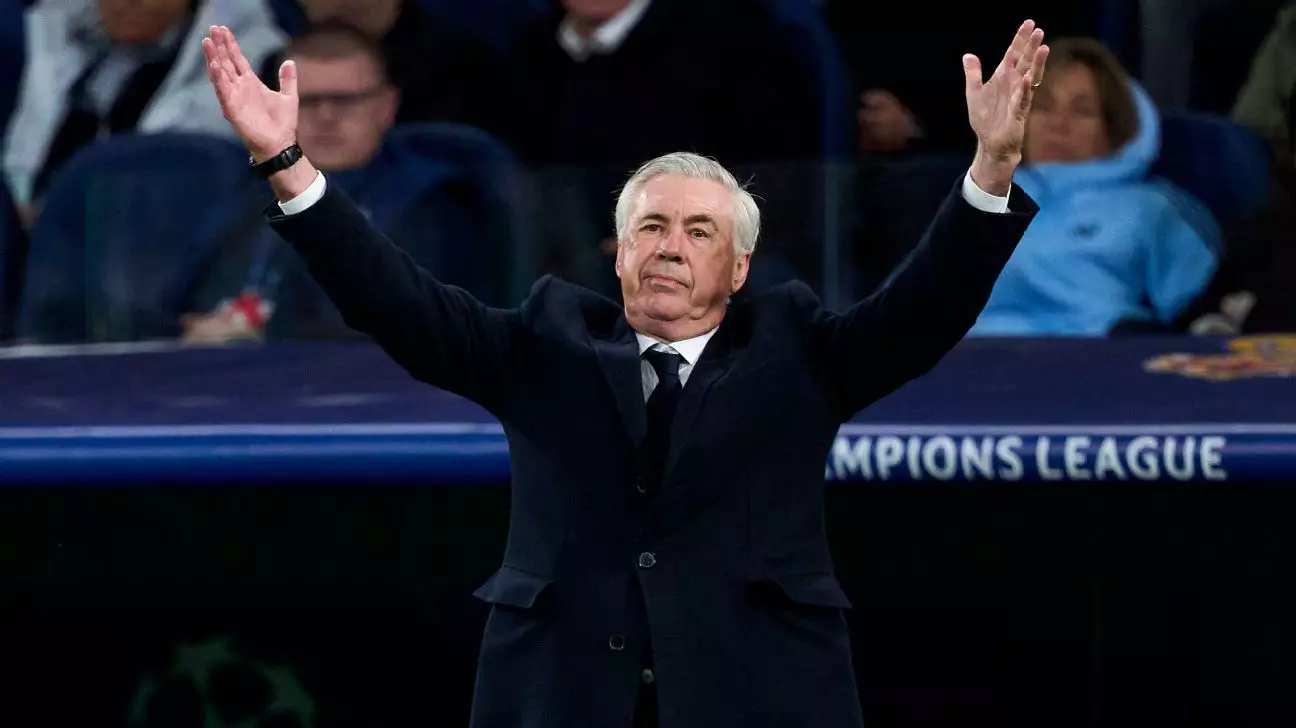Real Madrid’s recent exit from the Champions League, following a disappointing 2-1 loss to Arsenal, has cast a shadow over the club’s ambitions for the season. This defeat not only signifies the end of the reigning champions’ title defense but also raises questions about the future of their influential coach, Carlo Ancelotti. The defeat was compounded by the team’s lackluster performance in the first leg, where they were convincingly beaten 3-0 at the Emirates. Just as the team showed signs of resilience with Vinícius Júnior’s quick equalizer to Bukayo Saka’s opener, the late strike from Gabriel Martinelli sealed their fate, advancing Arsenal to the semifinals with a resounding 5-1 aggregate score.
These results catalyzed a wave of scrutiny directed towards Ancelotti, a manager who has previously been lauded for his tactical acumen and leadership. Yet, amid this turmoil, he appears uncertain about his future at the helm. Despite being under contract until 2026, Ancelotti expressed a contemplative stance in the aftermath of the game, suggesting that the club may opt for a change sooner than later. His ambiguous comments haven’t eased the pressure; instead, they have added to the speculation surrounding his tenure and the club’s direction as they grapple with the complexities of modern football.
Critique and Self-Reflection
Ancelotti’s open acknowledgment of the team’s shortcomings this season, including a series of disappointing performances against their arch-rivals Barcelona, is a form of self-reflection that is often lacking in elite football. However, the notion that a single overturned penalty decision—following a VAR review—could have shifted the course of the tie raises eyebrows. While VAR is meant to enhance fairness in games, placing too much emphasis on its potential influence can distract from the larger narrative of team performance and strategy.
Thibaut Courtois’ remarks post-match reflect a burgeoning critique amongst the players themselves. The Belgian international pointed out that the team needs to forge a stronger collective identity rather than relying on individual brilliance. He conceded that the squad’s current setup lacks a natural center forward—an assessment that underscores a significant strategic gap in Real Madrid’s lineup. With Joselu having departed, the team misses a focal point in attack to convert crosses into goals—a crucial element that aligns with Ancelotti’s preferred style of play.
A Divided Camp?
As the dust settles from the calamity at the Bernabéu, the potential divide among players, management, and club hierarchy becomes increasingly apparent. While Courtois stated that the players have “no problem” with Ancelotti, their subsequent performance—or lack thereof—speaks volumes. It’s crucial that players rally behind their coach, yet there seems to be a disconnect in their execution of game plans and teamwork. The players must discover a way to sync their individual talents into a cohesive unit. Real Madrid’s legacy is built on teamwork, flair, and the ability to thrive under pressure—qualities that have been sorely lacking this season.
The upcoming fixtures present a daunting challenge for Ancelotti and his team. With contests against Athletic Club and Getafe in LaLiga, following up with the highly anticipated Copa del Rey final against Barcelona, the stakes couldn’t be higher. These matches will serve as a litmus test, not only for the players’ resolve but also for Ancelotti’s ability to instill a winning mentality amidst uncertainty. Should Madrid fail to make a significant impact in these crucial encounters, the calls for a managerial change will intensify, overshadowing the club’s overall efforts.
Future Implications
As the season progresses, the board must assess whether the current vision under Ancelotti remains aligned with Real Madrid’s rich history. The tumultuous nature of football today, combined with the club’s recent performance trends, suggests that the path forward may require bold decisions. While restructuring the team could take time and might not guarantee immediate success, it remains fundamental in reinstating the winning culture that has helped define Real Madrid.
Ultimately, the club stands at a crossroads, with the potential to emerge stronger or falter under pressure. Whether Ancelotti will stay or go is less important than whether Real Madrid can rediscover its identity, strengthen team dynamics, and return to the summit of European football. Fan expectations are high, and the pressure is palpable; it is up to the players and management to respond decisively in a time where greatness is expected, if not demanded.

